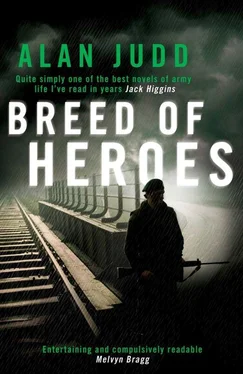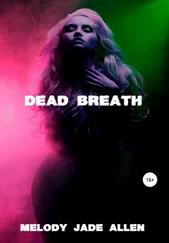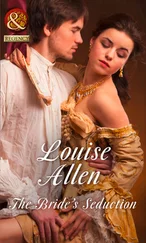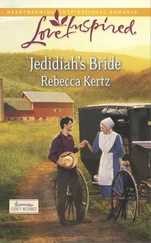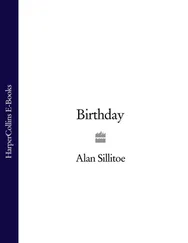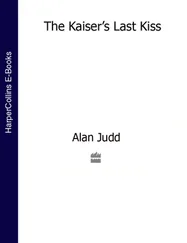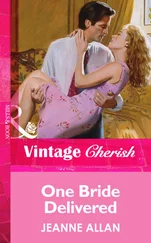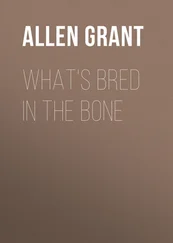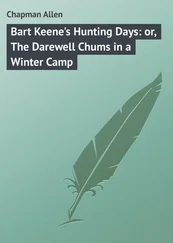Dinner passed. Charles was not sure how. He remembered going into the dining room and ordering. He knew he had eaten but could not recall whether it was a good meal or whether he just remembered someone — himself or Beazely — saying that it was. There had been an awful lot of talk, mostly, he thought, from Beazely. He clearly remembered leaving the hotel because Beazely had fallen in the reception area after shaking hands. He was glassy-eyed and feeling slightly sick when he returned to battalion HQ. There had been wine with the meal and something afterwards. Even on quiet nights no one in battalion HQ went to bed before two but, finding that neither his absence was commented upon nor his presence noticed, Charles crept away. He undressed slowly and made careful note of where he put everything. He did not put on the light. There was a moment of sheer panic, a draining, despairing, almost tearful moment, when he thought he had lost his pistol; but then he found it in the place in the bed where one would normally put a hot-water bottle. He passed an uncomfortable night.
Sitting at his desk in Colin Wood’s office the next morning Charles feebly pretended to be busy. He copied Philip Lamb’s list of names and telephone numbers from one book to another, then kept both. Philip had also established a card index and Charles sorted it twice without altering it. He drank several cups of instant coffee, without tasting any of it, which was probably an advantage. Fortunately, the adjutant really was busy and had no time to notice anyone else. There were, however, two telephone calls for him. The first was from an unknown major at the PR desk at Headquarters, telling him that he should come up for a briefing, saying that they would all be delighted to see him and adding that, before they ‘went firm’ on anything, could he help out a TV team that afternoon. They wanted to do a feature on how soldiers spent their off-duty time. Charles asked the CO, who said, ‘All right, so long as they don’t take up more than half an hour of the Ackies’ kipping time and so long as they don’t interview anyone. I hold you responsible.’ Charles then rang Edward, who said that the Factory was full enough already without half of Hollywood swarming all over it, but agreed to put a dozen soldiers at the film crew’s disposal when Charles implied that the CO was keen on the idea.
The second call sounded at first like savage interference on a waterlogged line. After a while it became clear that a human being was responsible for the noise and a little while after that Charles distinguished the word Beazely. He greeted him with barely more enthusiasm than he felt. There was more crackling, during which he distinguished the word helicopter. A minute or so of questions and answers established that Beazely believed he had been promised a ride over Belfast in a helicopter. ‘I’m afraid I haven’t any helicopters,’ said Charles.
‘Not you, Charlie, the Army. They’ve got plenty. Use one of theirs.’
‘I can’t.’
‘Why not?’
Charles snatched at the nearest reason. ‘They don’t do low-level flights over the city.’
‘One went right past my window this morning. Woke me up.’
‘They must have been looking for a car or something. They only do it then.’ It did not sound very convincing. Weariness lessened Charles’s scruples. ‘Anyway, all the helicopters are on border patrol duty today.’
‘What about the one outside my window?’
‘Except for those with urgent operational tasks.’
There was a pause. He could imagine Beazely lighting a cigarette. ‘Get me on one of those then. The border’s better than nothing.’
‘But there’s nothing to see.’
‘That’s the point. There’s a story in that.’
‘Well, I can’t do it. It’s out of our area. Ring Headquarters. They’ll fix it for you.’
‘They won’t. They know me. Come on, Charlie, you must have something. I mean, a report on the incidence of flat feet would do. My news editor’s going crazy. If I don’t feed him something for tomorrow he’ll kill me.’
Beazely sounded seriously distressed. One or two of Charles’s stray scruples came wandering back. After all, he might have referred to the possibility of helicopter rides, in a general sort of way. ‘How about a feature on soldiers’ leisure activities?’
Beazely snorted, causing the telephone to crackle horribly. ‘I did that last week. They didn’t print it.’
‘Well, do a follow-up. Jazz it up a bit. There might be a new angle.’
‘What sort of new angle?’
‘I don’t know. You’re the journalist. I’ll take you to a terrible place where they live, if you like. Something worse than you’ve ever seen. Bring a camera.’
Beazely eventually agreed. He could think of nothing better to do, that was all. It was better to be doing something than sitting around in the hotel getting drunk and frightened.
When Charles arrived at the Factory that afternoon there was a large hire-car parked by the gates. Standing with their hands above their heads and their faces to the wall were three men. A rifle was trained on them from the sentry sangar opposite. Charles got out of his Land-Rover and approached the sangar with a growing unease.
‘Can you identify these men, sir?’ said the sentry’s voice. From close to, his face was just visible.
‘No, I can’t,’ said Charles. ‘At least, not at the moment. Who do they say they are?’
‘They said they’re television blokes.’
‘Well, that’s who they are, then. They’re expected. Did no one tell you?’
Even in the darkness of the sangar the sentry’s expression could be seen to be disgruntled. ‘No one told me, sir.’
‘Did you ask for any identification — press cards or anything?’
‘No, sir.’
Charles started to walk towards the men. ‘You can lower your rifle now.’ The sentry reluctantly withdrew the barrel. Charles introduced himself and apologised. They seemed to take it in good part and even smiled when he asked if they’d been there long. Long enough, it seemed, for their arms to ache. One man, large and bearded, soon produced a camera from his car and another, short and balding, produced recording equipment. The third man was beautiful. He was of medium height, slightly built, with wavy blond hair, strikingly blue eyes, a tanned complexion and a very friendly smile that displayed small even teeth. He wore an expensive light raincoat with wide lapels, belted tightly at the waist. He was the only one of the three unencumbered by equipment. He was Jonathan Kingsley, a name well known from television documentaries. ‘It’s quite all right,’ he said to Charles as they shook hands. ‘You really must not worry.’
‘Thought the car might have a bomb in it,’ said the sentry as he opened the gates. ‘Stop all cars. Major Lumley’s orders.’
Jonathan Kingsley smiled disarmingly at him. ‘A bomb? With us in it?’
‘Edward Lumley is rather enthusiastic,’ said Charles. ‘He’s the company commander.’
Jonathan Kingsley smiled again, looked straight into Charles’s eyes, his head bent to one side. ‘Sounds exciting. Hope we can meet him.’
Charles escorted them into the Factory and upstairs whilst they explained what they wanted to do. He had to leave them outside the ops room as the CO had said that no journalists were to be allowed in any ops room anywhere. He found Edward sitting on the map-table, eating an apple and discussing rugby with the CSM. His face fell when he saw Charles. ‘Oh Christ, you here? You haven’t brought them with you, have you?’
‘They’re just outside the door.’
‘I don’t have to meet them, do I?’
‘It might look odd if you don’t. You don’t have to say anything, except hallo. They’re not going to interview anyone.’
Читать дальше
